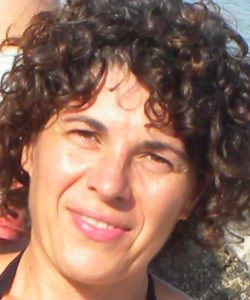EMS Tromp Award 2018 to Fiorella Acquaotta
Award for an outstanding achievement in biometeorology
The EMS Tromp Award for an outstanding contribution in bioemeteorology 2018 will be presented to Fioralla Acquaotta, Italy, nominated with the paper: “Role of climate in the spread of shiga toxin-producing Escherichia coli infection among children”, F. Acquaotta, G. Ardissino, S. Fratianni, M. Perrone, published in April 2017 in Int J Biometeorol, 61:1647–1655, DOI 10.1007/s00484-017-1344-y

The prize will be presented during the EMS Annual Meeting 2018 on 3 September 2018 in Budapest, Hungary. The awardee will receive $US 1,000 and travel expenses to attend the EMS Annual Meeting. Fiorella Aquaotta will give the award presentation on Monday, 3 September 2018 at the Session OSA2.5 Atmospheric effects on humans.
The Tromp Foundation (Foundation for Biometeorological Research), the legacy of Solco W. Tromp, is funding this award with the intention to promote biometeorology in Europe. Biometeorology is an interdisciplinary science studying the interactions between atmospheric processes and living organisms – plants, animals and humans. It provides answers to the question How does weather and climate impact the well-being of all living beings?
EMS Tromp Young Scientist Travel Awards
The Tromp Foundation also funds six Tromp Foundation travel awards for young scientist (TFTAYS) for papers that are presented at the EMS Annual Meeting specifically on topics in biometeorology. The following recipients have been selected:
- Lívia Labudová (Slovakia), presenting
Monitoring of drought impacts and the DriDanube project
in session ES1.3 Impacts: vulnerability and adaptation to climate change.
The following presentation will all be given in Session OSA2.5 Atmospheric effects on humans:
- Claudia Di Napoli (UK), presenting
Towards a pan-European forecasting system for heatwave-related health hazards - Coral Salvador (Spain), presenting
Health effects on daily mortality of a hydrological extreme: the case of the droughts in Galicia, Spain - Irena Nimac (Croatia), presenting
Urban climate of Zagreb (Croatia) – its characteristics and changes - Mikhail I. Varentsov, presenting
Effects of the climate change and city development on summering urban heat
island and heat stress indices for Moscow megacity - Dian Csenge (Hungary), presenting
Urban heat island intensity analyse based on surface and air temperature measurements in Budapest.
Who was Solco Walle Tromp?
Solco W. Tromp was born on March 1909. He studied geology and geography at Leyden University, The Netherlands, and after he received his PhD he worked as an exploration geologist for oil companies. During World War II he became involved in de Dutch section of MacArthur’s Headquarters. After the war, he studied physiology and meteorology; in 1947 he became a Professor of Geology at the King Saud University in Cairo, Egypt; from 1950 to 1955 he was a geological consultant at the UN Technical Assistance programme for Central America and the Middle east.
In 1955, he switched to biometeorology and founded the Biometeorological Research centre in Leyden. In the same year he founded the International Society for Biometeorology of which he was secretary until 1976. Solco Tromp combined three distinct qualities, a highly scientific mind, a logical intellect and an excellent organisational talent. By 1953, he already achieved a substantial bibliography on topics, which we may refer to as biomedical science or medical geography. His remarkable productive energy continued to the time of his death in 1993.
As a person, Solco Tromp was very courteous, full of humour and with a great zest for life. He became the main promoter of biometeorology for many years after his geology career. After he died part of his legacy was allocated to The Tromp Foundation (Foundation for Biometeorological Research). The aim of the Foundation is to promote Biometeorology.


Kommentare sind geschlossen.